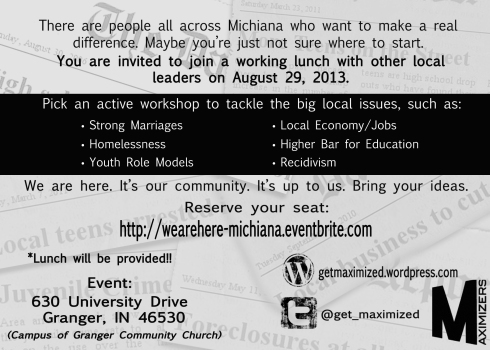Yesterday we had around 80 people from all over Michiana gather to discuss ideas and action steps to make our community a better place. Collectively, we accept the responsibility of any significant and sustainable change that we expect to see.- It’s up to us; not some other organization; not the government; not some savior employer.
With facilitation help from Maximizers group and ConnectHelp volunteers, the discussions centered around topics, such as:
- Recidivism
- Youth Role Models
- A Higher Bar for Education
- Homelessness
- Local Economy & Jobs
- Building Stronger Marriages
Over a two hour span, each group developed some significant solutions to group-identified problems. Each group all left with action steps for the respective areas of impact. It was amazing to hear to the recap from each group. Over the next few days, we will post highlights from each of these groups.
As you read through the notes, try to think about what your next step might be. What is your area of passion? Where can you plug in? Who do you know? What would it look like in 5 years if we all took one more step forward for the good of our communities?
We are still here. Let’s go do something about it!
*A special thanks to the Granger Commons staff – what an amazing facility and staff! If you’re in the Michiana area, host your event here!



